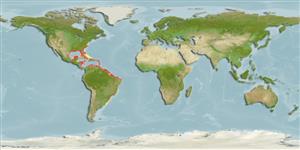Common names from other countries
Teleostei (teleosts) >
Gobiiformes (Gobies) >
Gobiidae (Gobies) > Gobionellinae
Etymology: Gobioides: Latin, gobius = gudgeon + suffix oides = similar to (Ref. 45335).
More on author: Lacepède.
Environment: milieu / climate zone / depth range / distribution range
Ecology
Marine; freshwater; brackish; demersal; amphidromous (Ref. 46888). Tropical; 14°C - 32°C (Ref. 97140)
Western Atlantic: Charleston, South Carolina southward to Florida, along the Gulf of Mexico coasts of Alabama, Mississippi, Louisiana, and eastern-central Texas; along the Caribbean coast of Colombia, eastward to Venezuela, Surinam, Guyana, French Guiana, and Brazil as far south as Rio Grande do Sul, Brazil.
Size / Weight / Age
Maturity: Lm ? range ? - ? cm
Max length : 55.3 cm TL male/unsexed; (Ref. 13628); common length : 25.0 cm TL male/unsexed; (Ref. 6077); max. published weight: 311.00 g (Ref. 13628)
Adults prefer muddy bays and estuaries; encountered in fresh water (Ref. 13628), with a salinity range of 0.0 to 25.5 ppt (Ref. 97140). Also found offshore on muddy bottoms, off mouths of large rivers. Largest goby in the Caribbean, and the only one with this distinctive eel-like shape (Ref. 26938).
Life cycle and mating behavior
Maturities | Reproduction | Spawnings | Egg(s) | Fecundities | Larvae
Murdy, E.O., 1998. A review of the gobioid fish genus Gobioides. Ichthyol. Res. 45(2):121-133. (Ref. 27974)
IUCN Red List Status (Ref. 130435)
CITES (Ref. 128078)
Not Evaluated
Threat to humans
Harmless
Human uses
Fisheries: minor commercial; bait: occasionally
Tools
Special reports
Download XML
Internet sources
Estimates based on models
Preferred temperature (Ref.
115969): 23.4 - 28, mean 25.9 (based on 452 cells).
Phylogenetic diversity index (Ref.
82804): PD
50 = 0.5312 [Uniqueness, from 0.5 = low to 2.0 = high].
Bayesian length-weight: a=0.00102 (0.00046 - 0.00225), b=3.06 (2.88 - 3.24), in cm Total Length, based on all LWR estimates for this body shape (Ref.
93245).
Trophic level (Ref.
69278): 3.8 ±0.5 se; based on size and trophs of closest relatives
Resilience (Ref.
120179): Low, minimum population doubling time 4.5 - 14 years (Preliminary K or Fecundity.).
Fishing Vulnerability (Ref.
59153): Moderate vulnerability (42 of 100).
